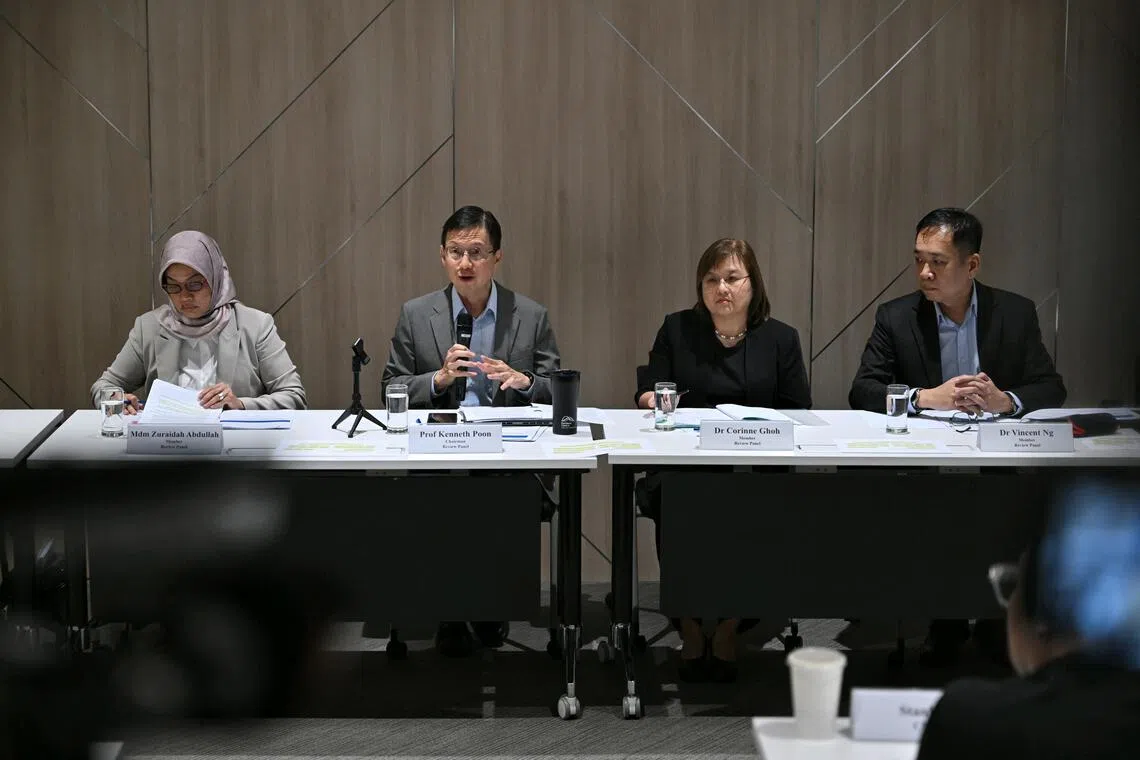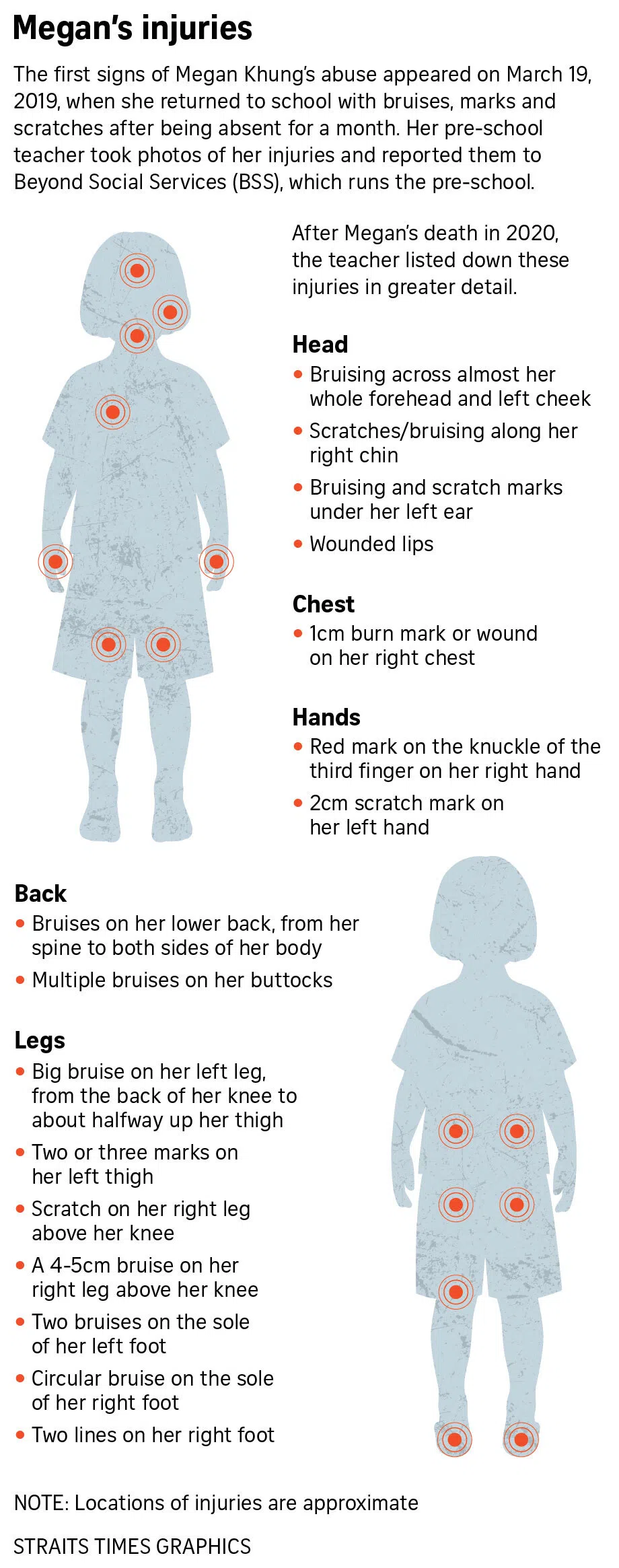Fatal abuse of Megan Khung: Review panel finds breaches by agencies, Masagos apologises
Sign up now: Get ST's newsletters delivered to your inbox

Megan Khung died on Feb 22, 2020, after more than a year of horrific abuse by her mother and the woman’s then boyfriend.
PHOTOS: CCXXCXCX/INSTAGRAM, SHIN MIN DAILY NEWS READER, INSTAGRAM
- An independent review panel found breaches in Megan Khung's case including CPS not registering calls and police failing to follow procedures, leading to missed opportunities to protect her.
- The panel recommended seven measures, including making clear which agencies are charged with managing child abuse cases and creating an appeals mechanism for cases with differing views.
- MSF Minister Masagos Zulkifli apologised, stating agencies involved accept the panel's findings and are committed to strengthening child protection processes
AI generated
SINGAPORE – An independent review panel has found a series of breaches by agencies in the handling of Megan Khung’s case, including a Child Protective Service (CPS) officer failing to log calls from the girl’s pre-school seeking help, and police officers not following procedures.
Four-year-old Megan died on Feb 22, 2020
To prevent similar incidents, the panel made seven recommendations in a 42-page report released on Oct 23.
These included making clear which agencies should manage child abuse cases and setting up an appeals mechanism to review cases where there are differing views on how they should be managed.
Responding to the report, Minister for Social and Family Development Masagos Zulkifli said: “As the lead for the national child protection ecosystem, I would like to say that we are sorry for the outcome and acknowledge that more should have been done when we handled the case.
“We cannot eradicate every risk of a child loss. But our resolve is absolute: We will do everything possible to prevent the recurrence of such tragedies.”
The Ministry of Social and Family Development (MSF), which oversees the CPS, said all the agencies involved in Megan’s case have accepted the panel’s findings in full.
Two police officers have been disciplined for not following procedures. The police said one officer has since resigned, while her supervisor was given a financial penalty.
MSF has started a disciplinary investigation into the actions of the CPS officer. Depending on the findings, the officer could face actions ranging from counselling to a financial penalty, said the ministry.
“The officer could also have adjustments made to performance assessments, which carry financial consequence,” the ministry added.
The panel’s report comes after MSF said on April 11 that it would conduct a review of the case
MSF announced the review three days after it said that Beyond Social Services (BSS), which runs the pre-school Megan attended, did not escalate the case to the CPS
The CPS manages high-risk child abuse cases and has the powers to remove a child from his family for protection.
On April 8, MSF had said the report that BSS submitted to the Early Childhood Development Agency (ECDA) did not fully describe the severity of Megan’s injuries, compared with the evidence presented in court when her mother, Foo Li Ping, and Foo’s former boyfriend, Wong Shi Xiang, were charged.
This led to “inadequate interventions” by the relevant agencies, MSF said then. ECDA is the regulatory authority for pre-schools here.
On April 3, Foo, 29, was sentenced to 19 years’ jail
Mr Masagos said he appointed the panel, headed by Professor Kenneth Poon, in May to conduct an independent review of the handling of Megan’s case.
Prof Poon is Singapore’s representative on the Asean Commission on the Promotion and Protection of the Rights of Women and Children.
The other panel members are Associate Professor Vincent Ng, dean of the School of Social Work and Social Development at the Singapore University of Social Sciences; Associate Professor Corinne Ghoh of the Social Work department at the National University of Singapore; and Madam Zuraidah Abdullah, chief executive of Mendaki.
Mr Masagos said the agencies involved in Megan’s case had reviewed their actions in 2020. But “additional information” surfaced during and after the sentencing of Foo and Wong in April.
The MSF felt that a “fuller and more comprehensive review” would further strengthen the child protection system, he said.
Shortly after Megan died, BSS told the MSF it had called the CPS twice between Sept 20 and 25, 2019, but MSF could not find the calls in its case management system.
On April 9, a day after the MSF’s first statement on the case, BSS told the MSF it had found the time and date of one of the calls.
MSF then narrowed its search and found the audio recording of that call.
Breaches and lapses
The panel said that while the agencies had taken “appropriate actions” in some instances, there were areas where they “could have done better”.
It also noted instances of a lack of clear understanding and communication among the agencies.
The panel’s report listed five findings which showed a series of missed opportunities to save Megan.
It found that the CPS should have asked for more details of Megan’s injuries and family situation during the call with BSS, to better assess the case’s risk level. In addition, records of the calls made by BSS to CPS were not created or reviewed.
CPS failed to notice the discrepancy between BSS staff’s assessment and concerns, and Megan’s grandmother’s view that the child should be “fine”. The CPS officer appeared to accept the grandmother’s assessment and provided only immediate advice, like making a police report if there were concerns about Megan’s safety.
The officer did not register the call, contrary to CPS procedures then. As a result, the case was not escalated to the supervisor on duty – a step that might have prompted further probing.
In a joint statement, CPS and ECDA said: “The panel has highlighted areas where our agencies fell short. We acknowledge these shortcomings and will take steps to rectify them.”
MSF said it has started an internal disciplinary inquiry into why BSS’ calls to CPS in September 2019 were not logged as required.
In the statement, CPS said: “When handling the call, we should have probed for more facts about the case, before providing advice.”
It added that improvements have been made, with all incoming calls to the National Anti-Violence and Sexual Harassment Helpline being automatically recorded, transcribed and logged as case records.
The panel also found that police officers failed to follow established procedures, preventing timely and appropriate action on the first police report made by Megan’s grandmother on Jan 17, 2020.

Members of the review panel (from left), Mendaki chief executive Zuraidah Abdullah, Professor Kenneth Poon, Associate Professor Corinne Ghoh and Associate Professor Vincent Ng, at the release of the report on the Megan Khung case on Oct 21.
ST PHOTO: ARIFFIN JAMAR
The investigation officer (IO) assessed the case to be a child discipline matter of low safety concern.
She told the officer-in-charge (OC) of the duty team that she would find Foo, and the OC decided not to raise the case for discussion the next day during the regular case review session.
The IO tried unsuccessfully to find Megan and Foo for about two weeks and was later deployed for Covid-19-related duties.
She should have updated her supervisor when she was unable to contact Foo, the panel noted.
“Had Megan’s case been followed up appropriately in January 2020, the likelihood of Megan being located earlier would have been higher,” the panel said.
It also noted that Heart@Fei Yue – a child protection specialist centre that manages low- to moderate-risk child abuse cases – should have taken up the case when it received a call from BSS, given the information the BSS gave.
These included the fact that Megan’s whereabouts were unknown, and that she had been excessively punished in the past.
Improving the child protection system
BSS’ president Alvin Yapp said the social service agency has accepted the panel’s findings that it should have filed the incident report sooner. Its report to ECDA was submitted 17 days after Megan’s teachers first saw her injuries, as the pre-school principal was on overseas leave.
“Our incident report should have been more timely and complete, and for this, we are deeply sorry,” he said.
“We have made changes to how we work, but the truth is that we will always carry with us the weight of knowing we should have done better.”
Mr Masagos said there have been concerted efforts to strengthen the child protection system since 2020, and the panel’s recommendations build on existing measures.
One key recommendation is that child abuse cases should be handled by child protection case management agencies, such as CPS, child protection specialist centres and family service centres, which should be “adequately resourced”.
This is because child abuse cases are complex, requiring professionals with the right experience and competencies, and agencies equipped with the necessary systems and processes.
The panel also recommended setting up an appeals mechanism to address differences in views regarding risk levels and how cases should be managed.

Child protection work is not easy, said Mr Masagos, adding that social service professionals involved in such cases are among the most affected when their charges suffer harm.
“I hope that as a society, we recognise and appreciate our protection officers for their successful intervention in many cases... And if and when they do not succeed, as in Megan’s case, I hope that even as we want the system to do better, we all continue to support our professionals.
“By doing so, we are also helping to build a stronger protection ecosystem for the children.”
He said the MSF will strengthen its internal systems and improve how agencies communicate with one another.
“We will learn from this incident and do better.”



